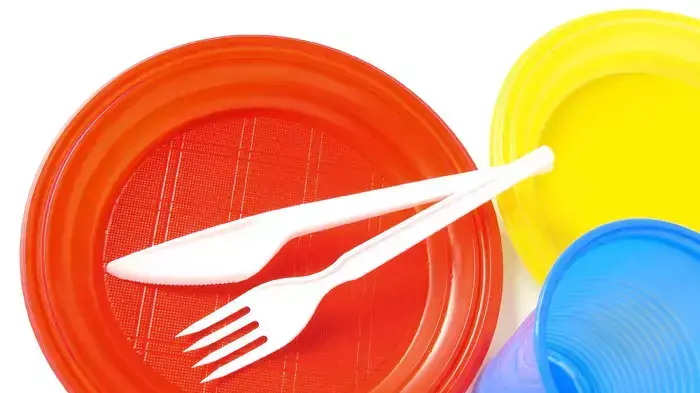Of money
news
Lieberman, Zandberg and the purchase tax that ignited the next confrontation
The Minister of Finance and the Minister of Environmental Protection are promoting the imposition of a purchase tax on disposable plastic utensils, the intention being to double the final price to the consumer.
If the plan is approved, a tax will be levied on: straws, plates, cups, cutlery and more, according to their weight.
Tags
The environment
Disposable dishes
Avigdor Lieberman
Purchase tax
Tamar Zandberg
Sonia Gorodisky
Monday, 19 July 2021, 14:46 Updated: 15:04
Share on Facebook
Share on WhatsApp
Share on general
Share on general
Share on Twitter
Share on Email
0 comments
Finance Minister Avigdor Lieberman and Minister of Environmental Protection Tamar Zandberg are promoting a purchase tax on disposable plastic utensils, with the intention of doubling the final price to the consumer.
If the plan is approved, the disposable utensils, such as straws, plates, cups, cutlery and others, will be subject to purchase tax by weight in stores.
The final mechanism of taxation has not yet been decided and is currently being discussed with the tax authority. The move is expected to bring in hundreds of millions of shekels To the state coffers and it will take effect after the Knesset approves it early next year.
More on Walla!
More money in the account: Where is the most profitable to open a savings plan?
To the full article
The new purchase tax will mainly hurt the ultra-Orthodox, the population that consumes more than all disposable utensils (Photo: ShutterStock)
A tax that is a fine for the ultra-Orthodox
This is a neutral tax that will apply to all sections of the population, to local imports and production based on the weight of the products, the purpose of the plan is to reduce the use of disposable plastic utensils.
This, in order to reduce the negative phenomenon - and unique in scope in Israel - of using disposable plastic utensils and align with those practiced in other advanced countries in the world that take similar steps.
At the same time, in Israel there is no doubt that the new purchase tax will mainly affect the ultra-Orthodox, a population that uses disposable utensils much more, both for kosher reasons and their suitability for both dairy and meat, but mainly due to the size of families in the ultra-Orthodox sector.
According to government sources, "the consumption of the ultra-Orthodox population is higher in relation to its share in the population, so on the one hand it will be over-taxing the ultra-Orthodox, and on the other hand this population uses lighter tools, so there is a balancing effect."
Avigdor Lieberman, Minister of Finance (Photo: Official Website, Ministry of Finance Spokeswoman)
Consumption in Israel is exceptional in level
This purchase tax will be similar in nature to that imposed on cigarettes and alcoholic beverages. The amount of the tax will be based on a study conducted by the Ministry of Environmental Protection that examined the willingness of domestic consumers to pay for disposable plastic products and characterized the sensitivity of consumers to the prices of these products.
The study found that doubling the price to the consumer is expected to reduce usage by close to 40%. The exact amount of the tax will be determined later, while examining a variety of considerations of the Tax Authority. The tax is levied on cups, plates, bowls, cutlery and straws. (Bottles are treated under the deposit, packaging under the packaging).
The reality in Israel is exceptional in other countries - the growth rate of consumption of plastic, one-time costs annually at a significant rate. In the last decade The rate of consumption of disposable utensils in Israel has doubled.
The annual household consumption of disposable plastic products is about 7.5 kg per capita, 5 times more than in the European Union. The annual expenditure of households is about NIS 1.3 billion. The total expenditure in Israel is approaching NIS 2 billion.
Government officials said "Quite a few countries like Ireland, for example, are following the ban policy at all, unfortunately we do not know how to do that in one day. And we're going on a policy of all the polluter pays. "
Plastic ware nonrecurring factors causing substantial environmental damage and negative effects on public health are clear. Tools are quickly becoming a useful product is waste that continues to exist in some cases thousands of years occupies a growing landfills, leads to an increase in costs of waste disposal, To pollute the sea, open spaces and public space and establish our dependence on polluting fossil fuels from which the plastic is
made.Officials in the Ministry of Environmental Protection are promoting further legislation that will ban the use of disposable tools on beaches.
Tamar Zandberg, Minister of the Environment (Photo: Yoav Itiel)
"Drowning in disposable plastic"
The Minister of Finance, Avigdor Lieberman:
"The consumption of disposable tools in Israel is increasing at a rapid and unusual rate. Economic incentives can direct the public to more environmental behavior. These, while leading to significant consumer behavioral change.
I have already instructed an office worker to part with the use of disposable tools. The decision we are making today is another step on the way to a greener country that is also aligned with the standards in the other developed countries in the world. "
Minister of Environmental Protection Tamar Zandberg
:" Like cigarettes and alcohol, disposable plastic is an addiction. While in the European Union, household consumption is estimated at 1.5 kg of disposable plastic containers per capita per year, in Israel, household consumption is 7.5 kg per capita, which is 5 times higher.
We are drowning in disposable plastic, and we all see its problematic impact on the cleanliness of the country and our quality of life.
Taxation is in line with the principle that the 'polluter pays', so whoever chooses to consume high-volume disposable utensils, is the one who will bear the most significant cost of the damage.
Disposable plastic production is based on polluting fuels and has a negative impact on the climate crisis as well.
I call on everyone to move to reusable tools, for the health and environment of us all. "
Share on Facebook
Share on WhatsApp
Share on general
Share on general
Share on Twitter
Share on Email
0 comments















/cloudfront-eu-central-1.images.arcpublishing.com/prisa/H7U7FJNUZBG6BPL5PZCMGC6EUY.jpg)